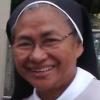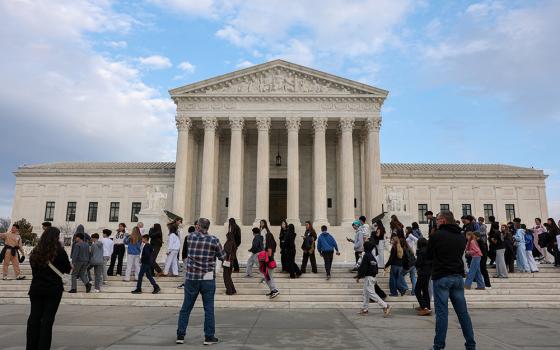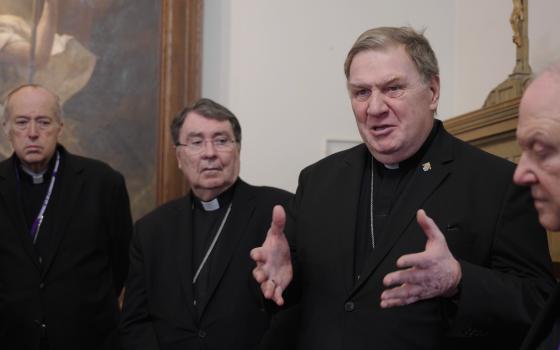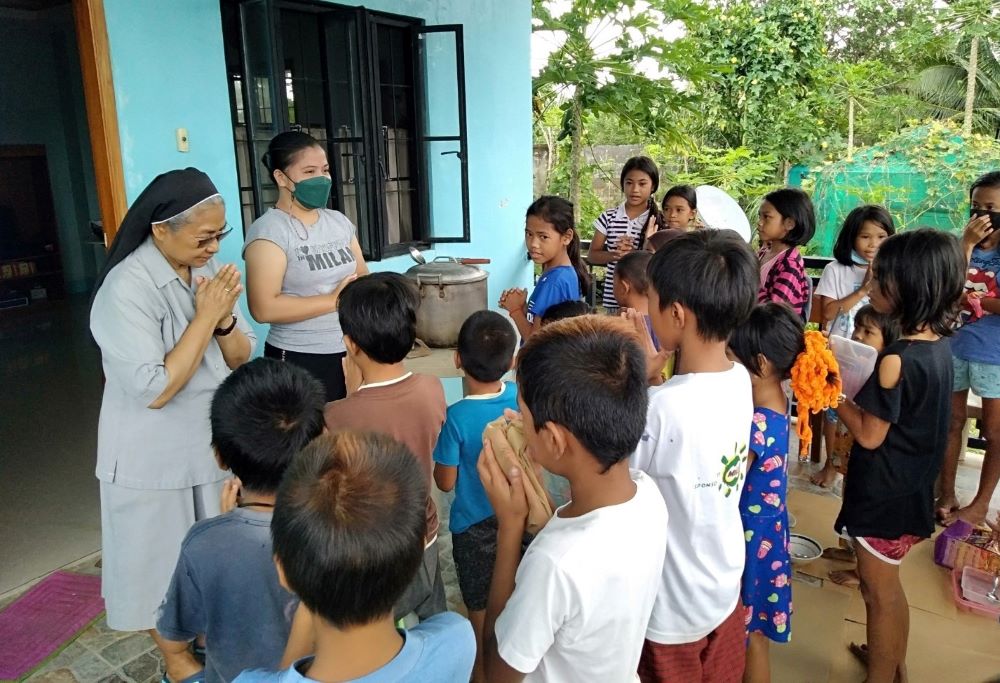
Missionary Benedictine Sr. Edita Eslopor, with the Philberth Foundation scholar volunteer, leads children from a nearby barangay in the Philippines in prayer before their meal. (Courtesy of Edita Eslopor)
The heart of health care is reaching out to offer relief and well-being to all people, especially the deprived, the underserved — those on the periphery. When we cure, we care; when we care, we cause the Divine Healer to work wonders on both the recipients and those who give care.
Indeed, when we care and when we are grateful, we attract miracles. I read somewhere that sometimes miracles are just good people with kind hearts that God sends our way.
I believe St. Scholastica's Hospital is a miracle; it was born in a dream and built in a series of miracles. The bishop of Catarman, Philippines, dreamt of a hospital that would address the health needs of the people of the diocese. The dream catchers were the Missionary Benedictine Sisters of the Manila Priory who shared the dream and summoned the elements in the universe to make that dream come true.
As the priory dreamt, miracles took place, from the choice of sisters sent to begin a community-based health program (CBHP), to the former vicar general of the diocese who assisted the search for land, and to the sisters' landlady who asked a friend to donate a portion of her land for the hospital. Then and there, God put everything in place. The friend donated 3.5 hectares (8.6 acres) of her land in Pambujan for the hospital. Another friend (a former scholar of St. Scholastica's College, Maria Fe Perez-Agudo, the CEO of Hyundai, Asia) shouldered the construction of the hospital and the convent. It was her way of repaying the kindness of the Benedictine Sisters.
We don't own the hospital, the hospital owns us — for it is God's project.
Three sisters made up the pioneer community: a doctor, a nurse and a social worker. I was delighted to be assigned to this new venture. As a licensed social worker, I could contribute in the outreach program and in coordinating with government and non-government agencies dealing with charity services. The group had the ideal composition, considering our long and tested experiences with community-based health programs and training community health workers (CHWs).
Our former mother general, Irene Dabalus, gave us pioneer sisters priceless insights on starting a mission hospital. The sisters then "talked their walk and walked their talk," coming up with a holistic vision of building a health care institution, with a mission focused on human development, the needs of the people and sustainable social transformation. Their goal was hospital–based and community-based health programs, because a hospital does not exist on its own but within the community. The CBHP envisioned a health care system that is relevant, accessible, preventive and responsive to the needs of the people.
It espoused the following strategies, outlined by the Council for Health and Development:
- Organizing and networking
- Education and training
- Provision of basic health services
I have been a member of the council's board of trustees for five decades. Although I am not a health professional, I believe in the advocacy of the doctors, nurses and staff who deliver services to the margins of our society without counting the cost. Their services on the peripheries are with relentless commitment undaunted by the government's red-tagging of activists.
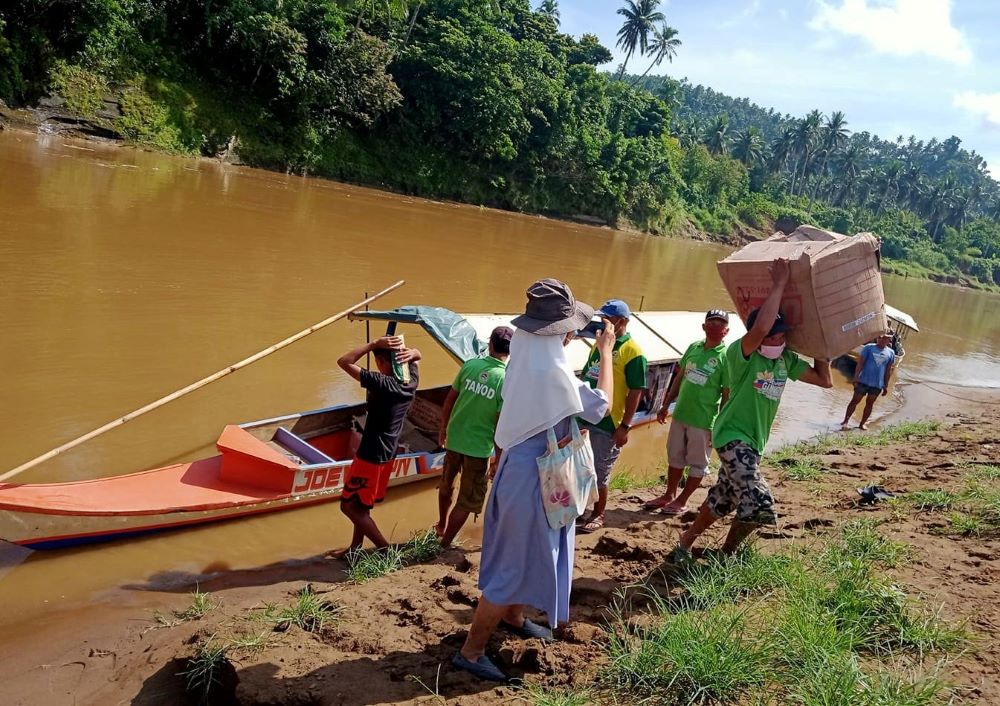
Sr. Amadea Donadilla, St. Scholastica's Hospital administrator, guides men bringing the goods for distribution to Ginulgan, one of the communities by the riverside, where the sisters minister. (Courtesy of Edita Eslopor)
The hospital is in Northern Samar, one of the poorest provinces in the Philippines. About 65% of its population lives in rural areas, and 75% are into farming coconut, rice and abaca. Eastern Visayas and three of the provinces in the region are part of the top 10 poorest provinces in the country: Eastern, Northern and Western Samar.
Ironically, the entire country is rich in natural resources. Eastern Visayas has rich deposits of coral, adobe, salt, gravel, earth, boulders, cobbles, and high-value minerals like bauxite and chromite. Northern Samar has abundant agricultural land and millions of coconut trees.
Despite all these resources, 43.5% of the population live in poverty in Northern Samar, and the annual average family income is below the annual average income in the rest of the country. Northern Samar is a hotbed of militant struggles of the peasants against oppression, landlessness, poverty, land grabbing and militarization.
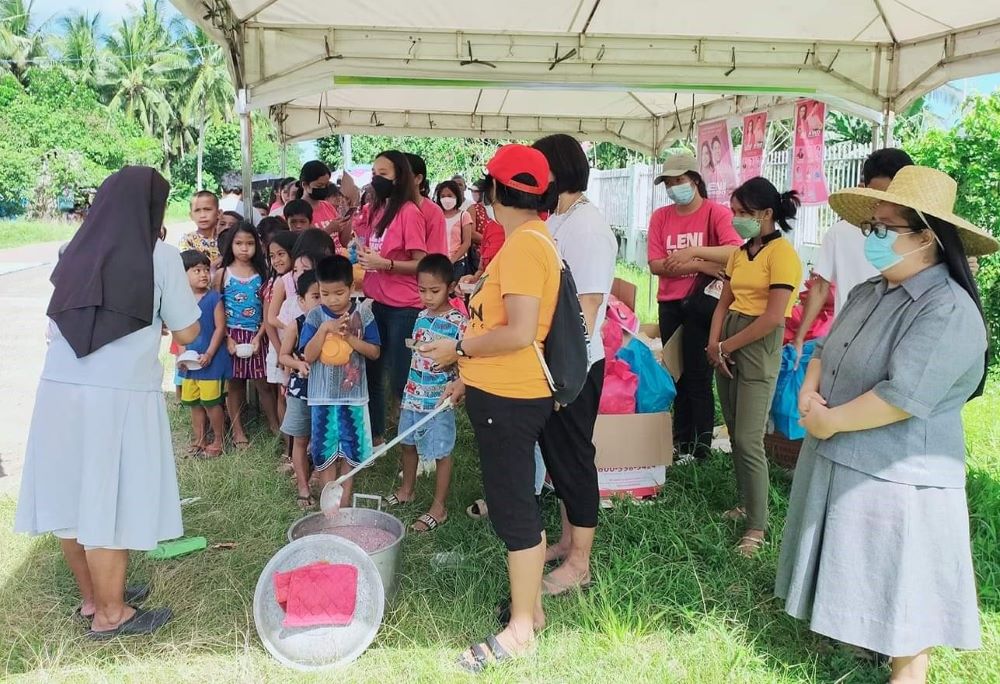
The community health workers, Philberth Foundation scholars, and the two sisters sponsored a meal for the children they serve in the Philippines. (Courtesy of Edita Eslopor)
The hospital operates in the barangay (neighborhood) of Cababtoan, in the coastal town of Pambujan — a municipality of more than 35,532 people in 26 barangays located mostly on the riverbanks. Residents travel by river boats, motorcycles and tricycles. The site of the hospital is strategic, because it serves patients from the nine nearby municipalities and other far-flung towns.
In keeping with our vision and mission, patients from all walks of life come to the hospital. Most are poor people from faraway islands, bringing with them nothing but the hope that the hospital can provide relief to their maladies. The government is obligated to provide financial assistance, so we partner with them and other government and nongovernmental institutions.
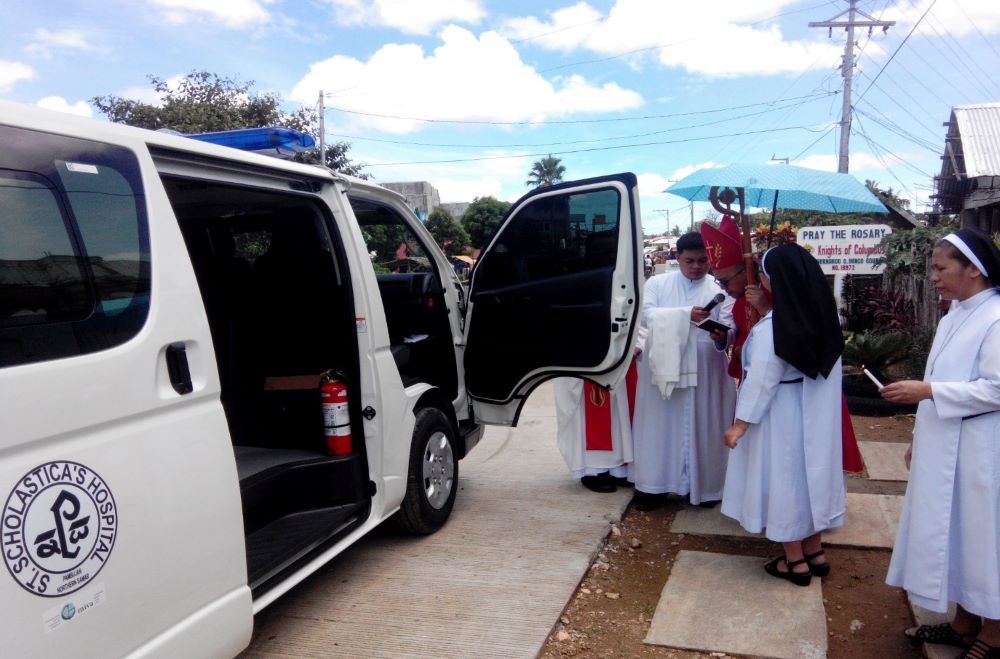
The bishop of Catarman Diocese blesses the ambulance of St. Scholastica's Hospital. Sisters from the hospital and from other congregations attended the ceremony. (Courtesy of Edita Eslopor)
Life in the Philippine missions is truly challenging, and life in the hospital is doubly demanding. The hospital confronts financial difficulties and staffing shortages since many health professionals prefer to work abroad or accept the higher salaries the government offers.
Nevertheless, we accepted the challenge and embarked on this mission, recognizing that the beginning is always the hardest. In these trying times we look ahead at our destination. I heard somewhere that difficult roads often lead to beautiful destinations. We don't own the hospital, the hospital owns us — for it is God's project. We work in it because God entrusted us to care for the people through our hospital and community-based health programs and to appreciate God's people on the periphery. Pope Francis has exhorted us to "go forth from our own comfort zone in order to reach all the 'peripheries.' "
Advertisement
I served at the hospital for four years, and one year in our pioneering missionary endeavors. My experiences in the hospital were enriching and challenging, especially among the people on the peripheries. This is despite the perils of being a missionary and harbinger of hope to despondent and sick people in our time and our country, and a lackluster president's poor governance.
But we know that God calls those who are underprivileged, and more readily available to receive his grace and not trust in their own efforts. And so, in this mission at this point, we trust God's presence to pervade all our ways and make straight our paths (Proverbs 3:6).
As Albert Einstein said: "There are only two ways to live your life. One is as though nothing is a miracle. The other is as though everything is a miracle."
